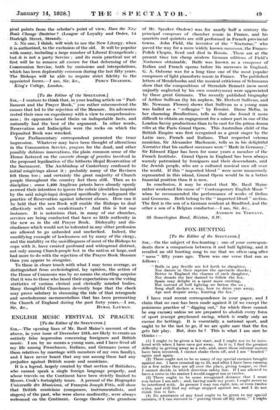[To the Editor of the SPECTATOR.]
venture to think that, in your leading article on " Parl- lament and the Prayer Book," you rather misconceived the causes that led to the rejection of the Measure. Its advocates rested their case on expediency with a view to comprehensive- ness; its opponents based theirs on indisputable facts, and naturally had the best of the argument. In other words, Reservation and Indiscipline were the rocks on which the Deposited Book was wrecked.
Your Parliamentary correspondent presented the truer impression. Whatever may have been thought of alterations in the Communion Service, prayers for the dead, and other possibly dubious innovations, the plain common sense of the House fastened on the concrete change of practice involved in the proposed legalization of the hitherto illegal Reservation of the• Sacrament. The Archbishop of Canterbury confessed to initial misgivings about it ; probably many of the Revisers felt them too ; and certainly the great majority of Church people throughout the country feel them still. Then as to discipline ; some 1,400 Anglican priests have already openly avowed their intention to ignore the rubric (doubtless inspired by the said misgivings) designed specifically to safeguard the practice of Reservation against inherent abuses. How can it be held that the new Book will enable the Bishops to deal effectively with such recalcitrants? And this is but one instance. It is notorious that, in many of our churches, services are being conducted that have as little authority in the new as in the old Prayer Book. Disloyalty and dis- obedience which would not be tolerated in any other profession are allowed to go unheeded and unchecked. Indeed, the unedifying example of lawlessness set by many of the clergy, and the inability or the unWillingness of most of the Bishops to cope with it, have created profound and widespread distrust, not only among Church people but in the nation at large, and had more to do with the rejection of the Prayer Book Measure than you appear to recognize.
To those in closer touch_ with what I may term average, as distinguished from ecclesiological, lay opinion, the action of the House of Commons was by no means the startling surprise that it was to those who based their expectations on the voting statistics of various clerical and clerically Minded bodies. Many thoughtful Churchmen devoutly hope that the check may prove salutary in stemming the tide of that retrograde and unwholesome sacramentalism that has been permeating the Church of England during the past forty years.—I am,


































 Previous page
Previous page